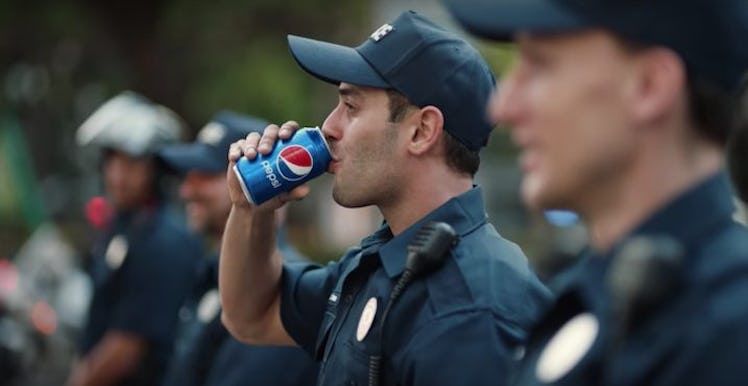
Pepsi Exploited Protests, But That’s Not What Made Its Commercial So Terrible
Make no mistake, the conversation surrounding that Pepsi ad is first, and foremost, hilarious.
Perhaps if enough people actually took it seriously, there'd be reason for outrage, but practically no one did.
Whether people were criticizing it for being insulting, or just plain bad, everyone seemed to agree: The ad was ineffective, at the very best.
So, laugh, guys. Definitely laugh.
But while we're on this subject, it's worth pointing something else out.
While it does seem like "everyone" agrees that the ad was ridiculous, you can be sure there are other people who don't see it that way.
In fact, if there's anything the past 12 months have taught us, it's that we can never underestimate the amount of people that don't agree with what we think is "obviously" true.
So proud of you @kendalljenner! Thank you @pepsi for choosing Kendall to be the face of your new campaign! #Pepsi #PepsiMoment #LiveforNow pic.twitter.com/YsAa9cBG2O — Kris Jenner (@KrisJenner) April 4, 2017
A reason to say "what about..." will always be around.
"What about when a black person gets a scholarship that other races can't, is that reverse racism?"
"Why do women get a history month and not men?"
What-about-ism is a hell of a drug, especially when it comes to matters pertaining to discrimination. This commercial is no different.
Someone could easily ask, "What about artists who profit by including protests in their songs too?" It's a valid question, even if barely.
This is where it becomes that much more important for the criticisms of Pepsi to be clear and precise.
That being said, it's time for us to get one thing straight: Exploiting (in a literal sense) and profiting off images of protests alone isn't what makes a production bad.
It is matter of fact that the movie "Selma" generated profit, for example.
No one, however, will criticize the fact that the movie did so by adopting a story based on the pain experienced by those who marched on Bloody Sunday over 50 years ago.
That's because the film immortalized the civil rights heroes who crossed the Edmund Pettus Bridge that day, and genuinely magnified the importance of their demonstration.
Pepsi did neither of those things.
It is a matter of fact that Beyoncé's "Formation," both the song and the tour, generated profit. Few, however, will criticize the fact that the video for the song was so popular because of how it used images of protests.
That's because "Formation" very clearly supported and amplified the message of the Black Lives Matter protest that Beyoncé was reenacting.
The Pepsi ad did neither of those things.
On the other hand, Pepsi's commercial was based on protests, which are all about taking a stand, but still avoided taking a definitive stand on anything.
Even worse, it took the familiar image of black women fearlessly confronting police officers, and replaced it with a smiling white woman who resolved a confrontation with police by showing a can of soda.
By the end of the clip, there was a lack of substance, and only one thing was clear: the video was an ad.
It wasn't an ad and a show of support for a certain movement. It wasn't an ad and a celebration of a cause. It was just an ad, and ads are meant to generate profit.
Naturally, critics were fixated on the profit. It's no wonder the ad got pulled.
Make no mistake, though.
The idea of profit alone isn't what put Pepsi at fault, it was the lack of genuine and substantive work.
That needs to be made clear, especially if we want to make sure that people to truly understand why it was so bad.